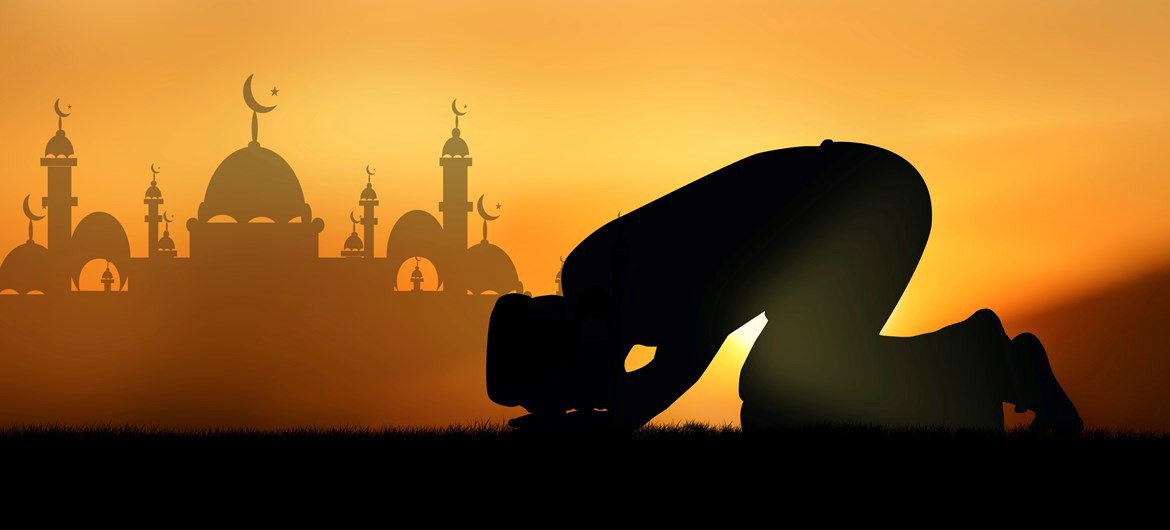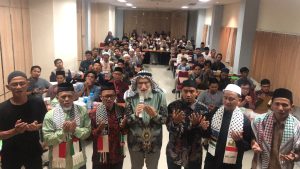By: Imam Yakhsyallah Mansur
On the word of Allah Subhanahu wa Ta’ala in Surah Al-Ma-un [107].
أَرَأَيْتَ الَّذِي يُكَذِّبُ بِالدِّينِ [١] فَذَٰلِكَ الَّذِي يَدُعُّ الْيَتِيمَ [٢] وَلَا يَحُضُّ عَلَىٰ طَعَامِ الْمِسْكِينِ [٣] فَوَيْلٌ لِّلْمُصَلِّينَ [٤] الَّذِينَ هُمْ عَن صَلَاتِهِمْ سَاهُونَ [٥] الَّذِينَ هُمْ يُرَاءُونَ [٦] وَيَمْنَعُونَ الْمَاعُونَ [٧] (الماعون [١٠٧]: ١ــ٧)
“Do you know people who reject religion? That is the one who rebukes the orphan. And do not encourage the feeding of the poor. So woe to those who pray. (i.e.) those who neglect their prayers. People who do riya’ and reluctant to (help with) useful things.”
Also Read: Verses of the Universe in Gaza: The Unyielding Light of Faith
Ibn Kathir in his commentary said, asbabun nuzul letter Al-Ma’un is related to the habit of Abu Sofyan and Abu Jahal who every Sunday slaughters camels. Once upon a time, an orphan came to ask for some of the meat they had slaughtered. But instead of being given meat, Abu Jahal and Abu Sofyan even rebuked and chased the orphans away.
Surah Al-Ma’un begins with hamzah istifham at the beginning of the word ara’aita. This shows the meaning of insya’ istifhām li ta’jūb (to show astonishment) to the person being spoken to. It aims to make people curious with a deep sense of wonder about who Allah the Exalted means as a religious liar.
The seven verses in Surah Al-Ma’un above describe the character of people whom Allah calls religious liars, namely those who rebuke orphans, do not recommend feeding the poor, people who are neglectful of their prayers, people who are pleased with them, and reluctant to give help, even with small, simple and trivial items.
Then, who are those “religious liars”? Prof. Dr. Hamka explained that the essence of “religious liars” are people who lie to the pillars of religion. There are five pillars of Islam, namely; creed, prayer, zakat, fasting and hajj.
Also Read: Prophet Sulaiman Alaihi Salam, the Greatest Muslim King of All Time
So for people who don’t care about the fate of orphans and the poor, then they are religious liars, meaning they have “lieved” their creed, “lyed” their prayers, “lieved” their fasts, “lyeded” their zakat, and “lie” his pilgrimage.
So, even if a person is diligent in praying, fasting and diligently carrying out other worship, if he does not care about the fate of orphans and the poor, then his prayers, zakat, fasting and pilgrimage will be in vain. Charity of worship has no impact on social behavior.
The main indicator of a person having concern for the fate of orphans and poor people is the expenditure of zakat maal (treasure) on the assets they have, not zakat fitrah.
Zakat maal has proven to be able to become the main instrument for poverty alleviation. In historical records, the figure who succeeded in utilizing zakat maal for poverty alleviation programs was a friend of Muadz bin Jabal, when he was a Wali in Yemen. Because there were no people who wanted to be given zakat, he sent the zakat maal of the people to Medina.
Also Read: Imaam Yakhsyallah Mansur: Surah At-Tin Indicates the Command to Liberate Al-Aqsa
Through Surah Al-Maun above, Allah Subhanahu wa Ta’ala wants to make us aware that ritual worship is meaningless if it is not reflected in the form of human consciousness, because goodness is a combination of transcendence (faith) and social behavior. So, Surah Al-Ma’un is Allah’s commandment regarding service to the community such as helping orphans, caring for the poor, helping neighbors, relatives, and others.
Surat al-Ma’un also contains criticism of individualism and materialism, namely attitudes that are only selfish without caring about the surrounding situation.
Individualism is contrary to Islamic values. In social life, Islam teaches to live side by side in harmony, respect each other, be tolerant and help each other. This is in line with the words of Allah Subhanahu wa Ta’ala:
وَتَعَاوَنُوا عَلَى الْبِرِّ وَالتَّقْوَىٰ ۖ وَلَا تَعَاوَنُوا عَلَى الْإِثْمِ وَالْعُدْوَانِ
Also Read: Imaam Yakhsyallah: Nurture Love for the Prophet, One Will Be with Whom One Loves
“Please help each other in goodness and piety. And do not help you in sins and transgressions.” (Qs. Al-Maidah: 2).
Individualist and materialistic lifestyles are characterized by accumulating as much wealth as possible for personal and family enjoyment. They are stingy, reluctant to set aside and distribute some of their wealth to the weak.
Yet the happiness that comes from an individualist lifestyle is only a pseudo-happiness. On the other hand, spending wealth in the way of Allah with zakat, infaq and alms is the essence of true happiness, true happiness, until the final yaumil.
There was an interesting study conducted by several students of a university in the city of Medan, North Sumatra in 2018, about the awareness of Muslims in that city in paying zakat maal.
Also Read: Friday Sermon: Emulating the Firmness of the Prophet in Struggle
In his report, it turns out that only 3.21 percent of Muslims in the city are already worthy of tithing, are aware and pay their zakat maal. That means, out of 100 Muslims, only three people do it.
This shows that the level of awareness and concern of Muslims for others, especially in terms of the obligation to issue assets is still very low.
Returning to the message of Surah Al-Ma’un above, there are four important points that must be of concern to Muslims, namely:
First, the command to do good to fellow human beings, especially to orphans and the poor.
Also Read: Imaam Yakhsyallah: Muslims Unity as Key to Victory of Islam
Second, the prohibition of neglecting prayer, namely people who do not practice the values of prayer in daily life outside of prayer, namely in social life.
Third, the prohibition of riya’, wants others to see that he has worshiped, wants to get praise because he has done the realm of virtue. Riya ‘will only erase one’s deeds like dust flying in a storm.
Fourth, the prohibition of being stingy, reluctant to give help to relatives, neighbors, co-workers and people around us. Even though the aid did not reduce his wealth.
A good human relationship with God must be followed by a good relationship with one’s relatives, neighbors, co-workers and people around them.
Also Read: Friday Sermon: Prophet Muhammad Is Not a Political Figure
Finally, let us reflect on a hadith qudsi which means: “Allah Ta’ala will say ‘O son of Adam, I am sick, but you do not visit Me.’ Allah replied, ‘Don’t you know that my servant so and so is sick, but you didn’t visit him? If you had visited him, would you have found me by his side?’
“Son of Adam, I asked you to eat, but you did not feed me. Adam’s descendants replied, ‘O Rabbi, how can I feed You, while You are Lord of the universe?’ Allah replied, ‘Don’t you know that My servant so and so asks you to eat, but you don’t feed him? Had you fed him you would have found his recompense with Me?’
“O son of Adam, I asked you to drink, but you didn’t give me something to drink.” Adam’s children and grandchildren asked, “O Lord, how can I give you a drink when you are Lord of the universe?” Allah replied, My servant so and so asked you to drink but you do not give to drink. Had you given him a drink, you would have found his recompense with Me?” (HR Muslim)
Hopefully, we are not all religious liars. So let’s increase our concern for the surrounding environment, for fellow human beings, especially those who are oppressed in various countries. May Allah Ta’ala forgive our sins. Amen Ya Rabbal Alameen. (T/RE1)
Also Read: Without Knowledge, Congregation Is Merely a Crowd Without Direction
Mi’raj News Agency (MINA)
































 Mina Indonesia
Mina Indonesia Mina Arabic
Mina Arabic